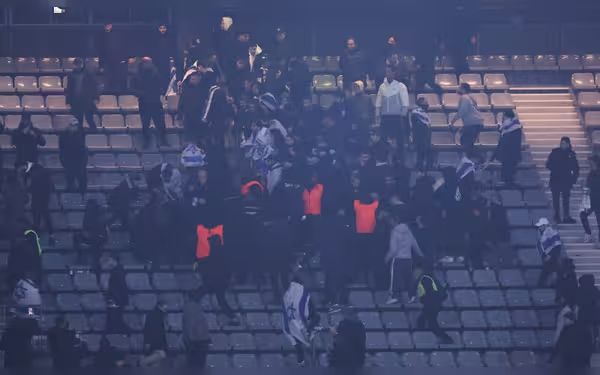Saturday, November 16, 2024 07:47 PM
France-Israel Football Match Sees 40 Arrests Amid Tensions in Paris
- 40 arrests made during France-Israel football match.
- Heightened security with 4,000 police deployed.
- Match ended in a goalless draw, lowest attendance recorded.
 Image Credits: brecorder
Image Credits: brecorderA tense France-Israel football match in Paris led to 40 arrests and significant security measures, ending in a goalless draw.
In a highly charged atmosphere, a football match between France and Israel unfolded at the Stade de France in Paris, leading to significant security measures and multiple arrests. The Nations League game, held on Thursday, was marked by heightened tensions following a violent incident involving fans of the Israeli club Maccabi Tel Aviv in Amsterdam just a week prior. This incident had raised concerns about potential clashes during the match, prompting authorities to implement a robust security operation.
To ensure safety, approximately 4,000 police officers and members of the French security forces were deployed both inside and outside the stadium. They were supported by an additional 1,600 civilian security personnel. Despite these precautions, the match saw stewards intervening to prevent confrontations between fans of both nations in the stands. Eyewitness accounts and videos shared on social media depicted scenes of chaos, with some fans brandishing Israeli flags while others responded with whistles and boos.
Paris police chief Laurent Nunez reported that a fight broke out but was quickly contained by the stewards. He emphasized that, from a security perspective, “the match went very well.” However, the situation did lead to 40 arrests, with one individual apprehended immediately after the altercation and another identified through CCTV footage.
Despite the tense atmosphere, the match concluded in a goalless draw. This result was significant for France, as it secured their qualification for the quarter-finals of the Nations League. Interestingly, the attendance for this match was notably low, with only 16,611 spectators present in the 80,000-capacity stadium. This marked the lowest turnout for a match involving the French men’s national team since the stadium's inauguration in the late 1990s.
The backdrop to this match was a series of violent incidents in Amsterdam, where Maccabi fans were attacked by local youths after a Europa League match against Ajax. Reports indicated that the Israeli supporters had engaged in provocative actions, including burning a Palestinian flag and chanting anti-Arab slogans. Amsterdam’s mayor described the situation as a “poisonous cocktail of anti-Semitism and hooliganism,” while some political figures attributed the violence to broader societal issues.
As tensions continue to rise globally, particularly in the context of the ongoing conflict involving Israel and Iran-backed groups in Lebanon and Gaza, the incidents surrounding this football match serve as a stark reminder of how sports can sometimes reflect deeper societal issues. The intersection of sports and politics is complex, and it is crucial for fans and authorities alike to foster an environment of respect and understanding, ensuring that the spirit of the game prevails over conflict.













